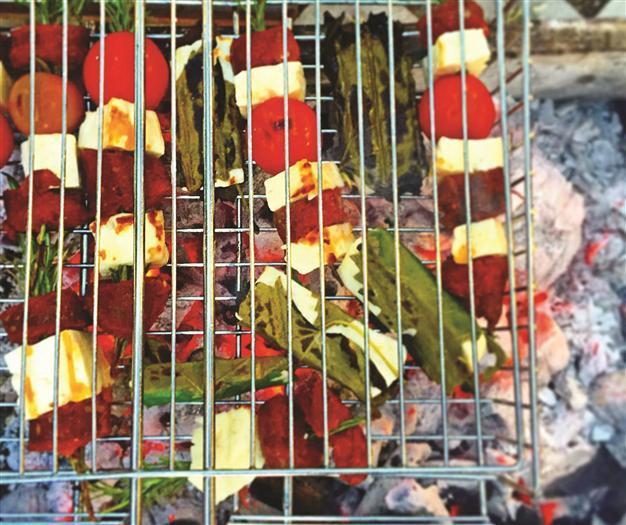Hellish Halloumi in Cyprus
Aylin Öney Tan - aylinoneytan@yahoo.com
 As peace talks resume in Cyprus and hellish arguments in Turkey are fired up over the Cypriot issue, it was the right time to revisit the island.
As peace talks resume in Cyprus and hellish arguments in Turkey are fired up over the Cypriot issue, it was the right time to revisit the island. I also had another excuse beyond political issues: I was due to have a series of tastings in various restaurants in Cyprus. I remember my last time there like it was yesterday, but now I realize that it has already been two years since my last visit. I was touring the Turkish part of Cyprus with my friend Refika Birgül, the renowned TV food personality and food writer. Together with her team, we explored the countryside mostly focused on food, visiting her lovely aunt who cooked us the perfect Sunday lunch (ah, the unforgettable olive bread!). We even made halloumi together from the freshest goat milk and had bucket loads of “ayrelli,” the foraged wild asparagus, on the way back. Refika is half Cypriot from her mother’s side, so it was a privilege to be with her to brush up my own memories of Cyprus, which span a period of almost 30 years.
My first visit must have been in the late 1980s, when memories of the Cyprus conflict were still very fresh.
When I lived in Algiers between 1984-86 all my neighbors were Cypriots, and through them I already had an idea of the islander attitude, their cuisine, and their funny expressions about food. They were my first exposure to Cypriot culinary ways. So my first trip was like revisiting a place that I’ve been to before but failed to remember. We were a crazy group and had lots of fun eating and drinking. We hired a lovely villa in Bellapais; our morning coffee was taken under the idle tree while our lunches were laced with lots of chilled white wine near the Bellapais Abbey.
Since then I have had countless visits to the island. I always chased the food, even if the occasion of the visit was for elections or a referendum. I looked at the political scene from a culinary perspective. Actually, that was not too difficult to do, as Cypriots have a tendency to express their sentiments and even political views through food.
Pilavuna versus Flauna
When Kofi Annan started the United Nations Annan plan to resolve the Cyprus dispute, food was the focus of his first visit to then-Turkish Cypriot President Rauf Denktaş. One food definitely stole the show: “Pilavuna,” an infamous savory pie filled with the iconic Cypriot cheese halloumi. That was a gesture, as the Greek side makes the very same food, calling it “Flaouna.” Funnily enough, it is made for Easter on the Greek side and it is made during Ramadan on the Turkish side. The religion may differ, but the food remains constant.
Whether it is the Greek flauna or Turkish pilavuna, that particular cheese filled pastry is about Cypriot identity. Both sides may be fine with adhering to their savory pie without arguing about its origins, but conflict starts when claiming the identity of the filling: Halloumi.
The squeaky Cypriot cheese is a lifestyle for both Greek and Turkish Cypriots. When the Greek side applied to the European Commission for a protected designation of origin status for the cheese, the Turkish side producers were outraged, claiming to make the most authentic halloumi on the island. I have never tasted the Greek Cypriot version, but from what I saw in Refika’s family I can confidently say that the cheese absolutely belonged to them! It was truly their family food, from breakfast to teatime, from family lunch to long, jolly meze-rakı nights, halloumi was their essential food item.
Any other debate further to this fact is just bad politics. I believe that people can keep their identity alive through food, even if the politicians fail. So let’s please stop the hellish halloumi debate: That cheese belongs to every single Cypriot, beyond ethnicity!
Bite of the Week
Fork of the Week: One wild experience of survival on the Turkish Cypriot side is to go to the “Ömerli Meyhane” in Lefkoşa (Nicosia), a Cyprus institution. If you can manage to get through 26 cold and 16 warm mezes, not to mention the final plethora of sweets, this is a place to witness the local way of dining. Like it or not, that is a true Lefkoşa experience with a vast amount of food served. There is no chance to argue with the bossy owner Ömer (known by the nickname “Tekerlek Ömer”), your only chance is to surrender and gorge on all the food - fuelled by copious amounts of booze. Ömerli Meyhane; Lefkoşa Baraj Bölgesi, Gönyeli Tenis Kortları / Gönyeli; Mobile: 0533 8639213
Cork of the Week: Cypriots are crazy about their choice of drinks. As booze is cheap, people are more relaxed ordering big bottles of hard liqueur to the table. Ordering rakı by the bottle is usual for us in Turkey, but when I saw bottles of Black Label Johnnie Walkers on table in Cyprus that felt strange! It is very Turkish Cypriot to drink whisky all through the night together with food. I did not dare to try this tradition; instead, I suggest opting for Tekirdağ Gold Series Rakı, which is far from cheap in Turkey but is amazingly affordable in Cyprus.












